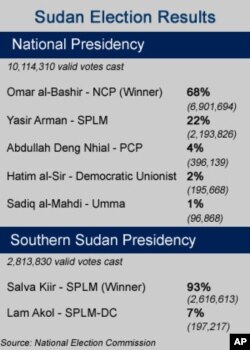Sudan President Omar Hassan al-Bashir has been announced the winner of the nation's first multi-party election in 24 years. Mr. Bashir is accused of war crimes in Sudan's Darfur region, and is the only sitting head of state wanted by the International Criminal Court. Opposition parties in Sudan have rejected the election results. Attention now turns to a southern independence referendum in eight months.
Sudan's election commission says President Omar Hassan al-Bashir won 68 percent of the votes. Under electoral law, he needed to surpass 50 percent to avoid a run-off election against his nearest competitor.
The northern secular Muslim fielded by the southern-based Sudan People's Liberation Movement to challenge Mr. Bashir, Yasir Arman, came in second, with 22 percent, most of which came from the southern states. He made a strong showing despite announcing his withdrawal from the race days before voting began, citing electoral fraud.
In Southern Sudan, the president of the semi-autonomous region and head of the SPLM, Salva Kiir, retained his seat with 92 percent of the votes from the region.
Some international observers, including those from the U.S.-based Carter Center, have predicted that the elections will fall short of international standards. Northern opposition groups widely boycotted the vote, citing what they call an unfair campaign environment and vote rigging. After five days of chaotic polling, charges of vote rigging have increased from the opposition.
But with the results final, the international community has indicated its efforts will be focused on securing the final implementation of a 2005 peace agreement between the Bashir government and the southern SPLM rebels. The accord includes a January referendum in the South on whether to remain part of the country or to secede and form a new state.
In his victory speech in Juba, Mr. Kiir said the Sudan elections were a key step toward his region's independence vote.
"These elections have given the Sudanese people, and Southern Sudanese in particular, a golden opportunity to decide by themselves who should run their affairs and prepare them to determine their future through the referendum in January 2011," he said.
The run-up to the referendum so far has been contentious, with several outstanding issues that analysts warn could derail the peace process.
With no major change in the leadership of either side, logistical planning for the referendum is expected to begin almost immediately.




